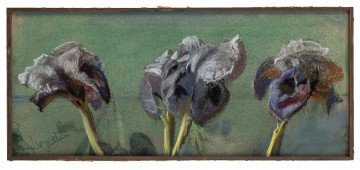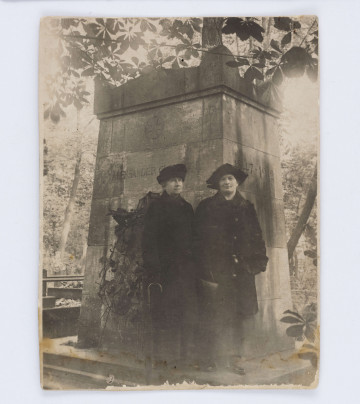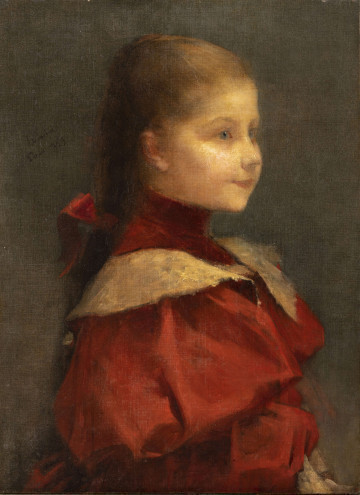
Irises
XIX/XX century
National Museum in Lublin
Part of the collection: Polish symbolic painting from the beginning of the 20th c.
The oeuvre of Witold Wojtkiewicz (1879-1909), considered one of the most important representatives of Symbolism and Expressionism in Polish painting, is one of the most original phenomena in the art of Young Poland. The artist studied at the Warsaw Drawing School and at the Academy of Fine Arts in Krakow in the ateliers of Leon Wyczółkowski and Józef Pankiewicz. He belonged to the artistic bohemia of Krakow and was associated with the environment of the Zielony Balonik (Green Balloon) cabaret. His paintings caught the attention of the writer André Gide and the painter Maurice Denis, thanks to whom the artist was able to organize a solo exhibition at the Galerie Druet in Paris in 1907.
Wojtkiewicz's art introduces the viewer into a world of grotesque-lyrical poetics that invokes the imagination, dreams, and a deformed reality populated with figures that symbolize the pain of existence, existential fears and obsessions. The composition At the Cemetery is a field of reflective deliberations, typical of Young Poland artists, associated with the idea of overwhelming evil, unhappiness, meaninglessness of life, transience and suffering. They are characteristic of the decadent mood of the era, which is aptly described by Kazimierz Przerwa-Tetmajer in one of the poems of the “Zamyślenia” [“Thoughts”] cycle:
Melancholy, longing, sadness, discouragement
Are the contents of my soul... With broken wings
My thoughts, instead of piercing the air,
Wander like weary cranes on the ground.
The composition, created a year before the untimely death of the artist suffering from an incurable disease of which he was fully aware, bears traits of authentic tragedy. The drawing depicts a figure in the scenery of a cemetery. Her pose reveals a sense of helplessness of a man plunged into despair. A narrow frame, restricting the composition to a fragment of nature represented by a forest landscape and crumbling tombstones, intensifies the atmosphere of gloom and anxiety. They become a symbol of the inevitability of fate and the drama of loneliness.
Anna Hałata
Author / creator
Dimensions
cały obiekt: height: 21 cm, width: 18 cm
Object type
drawing
Technique
feather drawing
Material
paper, cardboard, ink
Creation time / dating
Creation / finding place
Owner
The National Museum in Lublin
Identification number
Location / status

XIX/XX century
National Museum in Lublin

1924
National Museum in Lublin

1893
National Museum in Lublin
DISCOVER this TOPIC
National Museum in Szczecin
DISCOVER this PATH
Educational path